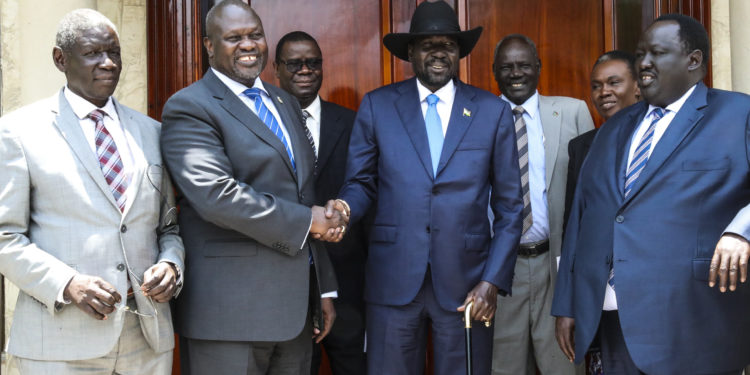By Millicent Zighe
Realising a conflict-free continent is the dream of every African. Ahead of the 33rd AU Summit we highlight the current hotspots; the root causes of conflicts; the various efforts in search of peaceful co-existence and development in line with this year’s theme of #silencingtheguns.
South Sudan has been in the grip of a massive humanitarian crisis since the country gained independence from Sudan in July 2011.
Political struggle between President Salva Kiir, who is from the Dinka community and Riek Machar, who is a Nuer is what ultimately plunged the country into an upheaval. Tensions intensified when Kiir dismissed Machar as the vice president. He then went ahead and accused latter of an attempted coup against his regime resulting to fighting between solders from Dinka and Nuer ethnic groups. Within days, violence spread like wildfire to Upper Nile, Unity States and Jonglei. Machar later came out and denied the coup allegations insisting that that was one of Kiir ploys to have him killed and wipe out the entire Nuer tribe in a genocide. Amidst the allegations, he flew to Juba and planned an uprising resulting in human rights violations including unlawful killings, arbitrary arrests, torture, beatings, sexual violence, and recruitment of child soldiers and vandalization of property.
Figures released by the United States Department reveal the violence has caused deaths of over 400,000 civilians. A further 2 million have been displaced, with women being the vast majority. An estimated 2 million people have sought shelter in the neighboring countries. UNHCR statistics show that Uganda hosts 861,590 Sudan 810,917, while Ethiopia and Kenya provide shelter to 334,014 and 119,799 people respectively. Another 88,203 live in DRC Congo. The refugee crisis is listed as the largest in the Africa and the third in the world after Syria and Afghanistan. The agency is now appealing for 1.4 billion $ in order to fund it.
Over half of the South Sudan refugees are children with 65,000 being registered unaccompanied or separated from their guardians, according to the UNCHR’s South Sudan Regional Refugee Response Plan 2019 – 2020. The government authorities accused the Sudan People’s Liberation Army – In Opposition of forcibly recruiting children into their military ranks in Rubkona County, in Northern Liech State. David Gai, South Sudan State Information minister alleged the recruitment was launched by SPLM-IO two weeks ago, forcing more children to flee their homes. The Deputy Military Spokesperson of the SPLM-IO Lam Paul Gabriel denied the allegations.
Government critics including human rights monitors and the opposition have also suffered torture castigated by the government security forces and the National Security Service (NSS). Human Right Watch (HRW) documented the case involving activist Peter Biar Ajak who was being held in solitary confinement at the NSS Juba headquarters. Inmates are often subjected to harsh treatments such as electric shock and beatings. HRW reports dozen have disappeared mysteriously or died in custody. Journalists have not been spared as many have been arrests for publishing articles casting the government in bad light. Kiir regime has also revoked the licenses of some media houses prompting UN to urge the country’s top leadership to respect the freedom of press and speech.
Under threats of International sanctions, South Sudan signed several peace treaties with the latest one being the Rome Declaration which was facilitated by Pope Francis. The warring parties agreed to implement the Cessation of Hostilities Agreement signed on December 2018 in Addis Ababa, Ethiopia. The rebels agreed to end all hostile military actions, vandalization of public property and to fully comply to humanitarian and international law. Nonetheless the two main principles failed to agree on the number of states the country should have. Kiir is adamant that he will maintain the 32 states something that Machar’s Sudanese People’s Liberation Movement in Opposition (SPLM-IO) and other opposition parties are against. South African Vice President David Mabuza is expected to deliver a verdict on the issue.
In an attempt to provide justice to the victims of the civil war, United Nations in conjunction with South Sudan Judiciary have been holding mobile courts throughout the country. In the 2015 peace treaty, both principles agreed to set up a Hybrid Court for South Sudan (HCSS) however to date the court has not been established. The only successful conviction in the country happened in 2018 after ten government soldiers were accused of killing a journalist and raping aid workers at Terrain hotel. It should be noted that the military courts lack jurisdiction to try cases of crimes against civilians.
President Salva Kiir is expected to form a transitional government by February 2020 after missing the November deadline.







